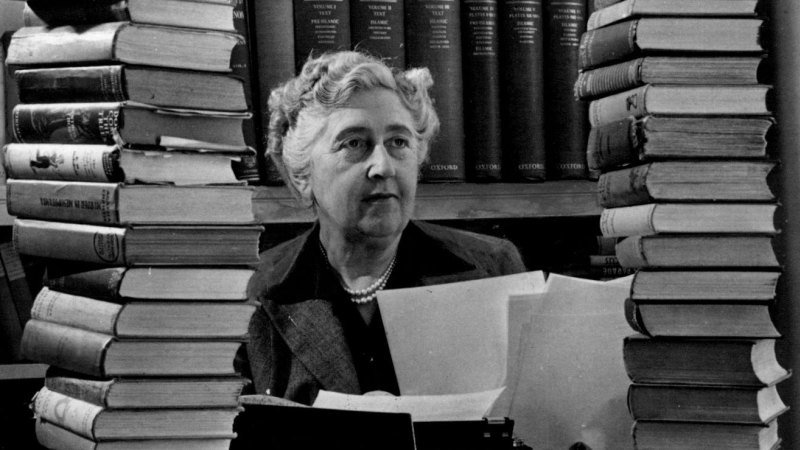As we approach 50 years since her death, it’s easy to lose sight of how remarkable the author was both in her life and work.
As we approach 50 years since her death, it’s easy to lose sight of how remarkable the author was both in her life and work.
By Elizabeth Flux
February 23, 2025 — 6.30pm
Unless you are 109 years old, then Agatha Christie books have been around for longer than all of us have been alive. Her novels have never been out of print, her stories are almost constantly being adapted for the stage and screen, and her ideas have laid the groundwork for generations of crime and mystery writers.
The problem with sustained success, however, is that the original accomplishments fade into the background. It’s easy to forget that what the author achieved was extraordinary – and as we approach 50 years since her death, it’s easier still to lose sight of how remarkable Christie herself was both in her life and work.

“One of the most extraordinary things about my great-grandmother as a writer is that she was a woman, and she was a woman born in 1890 in a small town in England – and became the best-selling novelist of all time,” says James Prichard. “I think that is underplayed as a concept.”
Prichard’s respect for not only Christie’s writing but her personal accomplishments and intellect comes across throughout the conversation. “For some reason feminists don’t grab hold of her in the way that they should do,” he reflects. “She was a pioneer, and she was an extraordinary, adventurous woman … we are still reading her stories, going to her plays, 100 years [on] … and she is the doyen of murder mystery writers. I think that says it all, really.”
His great-grandmother’s work has been a part of Prichard’s life since he was a child. He read his first Christie – Death on the Nile – at age nine, and now as the CEO of Agatha Christie Ltd spends his working days immersed in her stories.

It wasn’t a path he always knew he would follow, but now “I am very glad I did do this,” he says. “Lots of it is fun. Nearly all of it is interesting,” he adds. “It’s incredibly rewarding, and I think because of my family connection, I have a passion for it that you wouldn’t get elsewhere … the more I work with my great-grandmother’s work, the more admiration and respect I have for her.”
Part of Prichard’s role is overseeing official adaptations and it’s this in particular where Christie’s cleverness is thrown into sharp relief. “It is extraordinary how if you pull one piece out, suddenly it doesn’t work. They are incredibly intricate.”
Christie’s writing walks a fine balance of dark and light. Across her pages some of the worst elements of human nature come to life as her characters betray, swindle and, yes, murder one another. At the same time, her stories offer solace and catharsis in a way that real life does not. The crimes are solved by the end of the book, and justice wins out. At the heart of all her writing is the idea that right needs to triumph over wrong.
Advertisement
“One of my great-grandmother’s things was that at no time is murder justifiable,” says Prichard firmly. Of all her work, however, this idea is most sharply interrogated in And Then There Were None. First published in 1939, the novel is her bestselling book, and has been adapted for both the stage and screen. A new production, directed by Robyn Nevin, is currently being staged.
And Then There Were None is one of Christie’s most technically complex works. Ten strangers arrive on an island. Then, locked off from the rest of the world, things start going terribly wrong. Under the simple surface lies a complex web of a plot. “It’s a very extraordinary concept that my great-grandmother played with for quite a long time in her head and then managed to make work,” says Prichard. “She was incredibly proud of it.”

Earlier versions of the play – penned by Christie herself – have a happier ending than the novel. “The play she wrote in the middle of the war, and it was felt that the book ending was too bleak, really, for a population that was enduring a world war,” says Prichard. The current production, however, hews more closely to the original text, something Prichard is glad about. “I feel that the book ending is the right one,” he says.
“It really is a very brutal story.” And so, for a production of And Then There Were None to work, “You have to take it seriously,” he says. “The opening scene has quite a lot of humour in it as it’s a sort of a little character play for a little bit, because you have to build these characters up very quickly. And that’s quite fun and quite jolly. But once it starts, you have to feel that sense of danger.”
Loading
And Then There Were None is on in Melbourne at Comedy Theatre until March 23, Theatre Royal Sydney from May 3 to June 1, Perth at His Majesty’s Theatre from June 8 to 22, and Adelaide at Her Majesty’s Theatre from August 2 to 10.
The Booklist is a weekly newsletter for book lovers by Jason Steger. Get it delivered every Friday.
Discover more from World Byte News
Subscribe to get the latest posts sent to your email.


